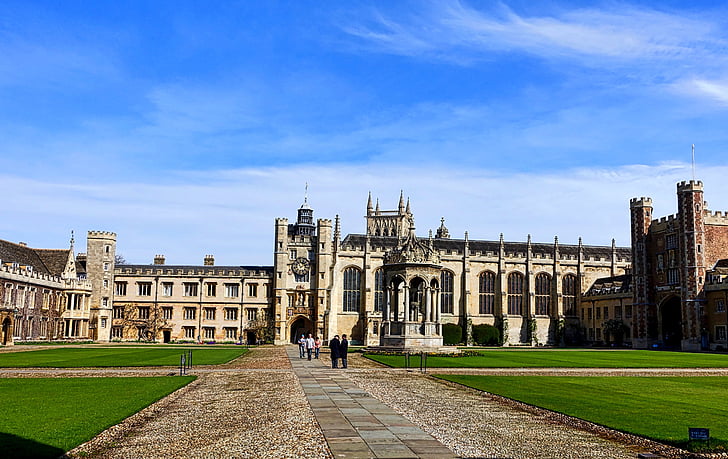In the field of engineering education, the UK has always been at the forefront of global study destinations due to its long history, top-notch scientific research strength and practical resources that are deeply integrated with industry. While the ‘G5′ giants—Cambridge, Oxford, and Imperial College London—rightly dominate discussions about the best university for engineering in the UK, the nation’s engineering excellence extends far beyond these institutions. From the University of Manchester’s legacy rooted in the Industrial Revolution to the University of Leeds’ pioneering work in intelligent transport systems and sustainable infrastructure, and the University of Nottingham’s breakthroughs in eco-friendly manufacturing and robotics, the UK boasts a dynamic spectrum of world-class engineering schools. Based on QS, U.S. News and other authoritative rankings, this article will unveil the top 10 good engineering universities in the UK, and analyse how these institutions provide students around the world with multiple choices beyond the traditional framework of prestigious universities with differentiated professional layouts, high employability rates, and industry-university-research integration models.
Best Engineering University Ranking in UK
| Complete University Guide | ||||
|---|---|---|---|---|
| Ranking | University | Overall score /Max 100 | Entry standards /Max 228 | Research quality /Max 4 |
| 1 | University of Cambridge | 100 | 226 | 3.69 |
| 2 | University of Oxford | 97.6 | 228 | 3.67 |
| 3 | University of Bristol | 96.4 | 208 | 3.56 |
| 4 | Durham University | 94.2 | 204 | 3.35 |
| 5 | University of Sheffield | 94.1 | 192 | 3.53 |
| 6 | University of Warwick | 92.7 | 181 | 3.37 |
| 7 | Loughborough University | 90.4 | 160 | 3.26 |
| 8 | University of Nottingham | 89.4 | 165 | 3.42 |
| 9 | University of Liverpool | 89.3 | 161 | 3.40 |
| 10 | University of Exeter | 88.8 | 161 | 3.24 |
| U.S. News | |||
|---|---|---|---|
| Ranking | University | Subject score | Global score |
| 1 | Imperial College London | 82.0 | 85.3 |
| 2 | University of Cambridge | 72.1 | 86.9 |
| 3 | University of Oxford | 72.1 | 88.2 |
| 4 | University College London | 72.0 | 86.5 |
| 5 | University of Manchester | 70.1 | 74.5 |
| 6 | University of Nottingham | 69.5 | 68.0 |
| 7 | Brunel University | 65.3 | 64.1 |
| 8 | University of Edinburgh | 63.0 | 78.2 |
| 9 | University of Strathclyde | 62.8 | 56.1 |
| 10 | University of Leeds | 62.6 | 68.1 |
| QS Ranking | ||||
|---|---|---|---|---|
| Ranking | University | Academic Reputation | Citations per Paper | International Research Network |
| 1 | University of Oxford | 91 | 95 | 95 |
| 2 | University of Cambridge | 92.7 | 92.8 | 87.5 |
| 3 | Imperial College London | 95.8 | 92.1 | 83.6 |
| 4 | The University of Manchester | 82 | 89.7 | 88.9 |
| 5 | UCL | 78.8 | 91 | 86 |
| 6 | The University of Edinburgh | 76.3 | 90.4 | 85.2 |
| 7 | University of Leeds | 71.8 | 88 | 90.7 |
| 8 | University of Southampton | 76.1 | 85.6 | 83.7 |
| 9 | University of Nottingham | 71.9 | 87.5 | 85.7 |
| 10 | The University of Sheffield | 75.1 | 87.5 | 77.6 |
We have collected ranking data from three organisations, all using different ranking systems and criteria. Five universities were mentioned several times, proving that they are recognised as the best UK university for engineering, attesting to their widely recognised quality of teaching and prestige: University of Cambridge, University of Oxford, University of Leeds, Imperial College London and University of Nottingham.
Top10 Universities for Engineering in UK
University of Cambridge
Location: The Old Schools, Trinity Ln, Cambridge CB2 1TN
Tuition Fees: Average £39,000 per year for international students
As Europe’s most comprehensive engineering hub and one of the top British universities for engineering, the University of Cambridge offers an exceptional academic journey through 16 specialized disciplines – from classic civil engineering to frontier fields like bioengineering and quantum technologies. Its distinctive four-year MEng program begins with two years of interdisciplinary fundamentals, where students master core principles before specializing in focused tracks like Energy Systems Design or Intelligent Systems Engineering.
The department’s research impact shines through real-world collaborations. Their award-winning carbon capture technology – recognized with the 2021 Queen’s Anniversary Prize – now actively reduces emissions in North Sea oil fields through BP partnerships.
What truly sets Cambridge apart is its human-scale learning environment. Through the collegiate tutorial system (particularly strong at Trinity and St John’s), students enjoy 1:3 staff ratios with personalized mentoring from world-leading engineers. This unique ecosystem – blending historic academic rigor with entrepreneurial verve – continues positioning Cambridge graduates at the forefront of solving 21st-century challenges.

University of Oxford
Location: The Old Schools, Trinity Ln, Cambridge CB2 1TN
Tuition Fees: Average £39,000 per year for international students
The Department of Engineering Sciences at the University of Oxford is orientated towards ‘solving global challenges’ and the curriculum is designed to break down traditional disciplinary boundaries. For example, its Biomedical Engineering programme combines mechanical engineering and medicine to develop wearable heart monitoring devices, while its Energy Systems programme integrates economics and engineering to investigate strategies for decarbonising the electricity grid. The Oxford Robotics Institute (ORI) is developing decision-making algorithms in the field of autonomous driving in collaboration with Waymo, and its ‘Oxford RobotCar’ has been tested on public roads in the UK. In addition, Oxford’s high-energy particle accelerator project with the European Centre for Nuclear Research (CERN) provides experimental data resources for nuclear engineering students.
An Oxford engineering team won the IEEE Robotics and Automation International Conference Best Paper Award in 2022 for developing the world’s first ethical decision-making algorithm for autonomous driving. Its Institute of Biomedical Engineering won the 2023 Dyson Design Engineering Award for its bionic prosthetic device, the Phoenix Hand, which is 1/10th the cost of a conventional device, and students have access to start-up funding through the Oxford Science and Technology Fund, with alumni-founded AI chip company Graphcore valued at more than $10 billion. Students also have access to start-up funding through the Oxford Science and Technology Fund, and Graphcore, an AI chip company founded by an alumnus, has been valued at more than $2bn.

University of Leeds
Location: The Old Schools, Trinity Ln, Cambridge CB2 1TN
Tuition Fees: Average £27,500 per year for international students
The University of Leeds is one of the best uni for engineering in UK. Its School of Engineering is focused on solving 21st century transport challenges, with its Institute for Transport Studies leading the research and development of noise control technology for the UK’s HS2 high speed rail project, which won the Institute of Mechanical Engineers (IMechE) Gold Award for Innovation in 2020. Its hydrogen-fuelled aircraft engine, developed in partnership with Rolls-Royce, has been recognised by Time Magazine as one of the world’s top 10 climate technology breakthroughs for 2022. The University of Leeds has a practical approach to its curriculum, with Civil Engineering students taking part in the Smart City Design Challenge, using sensors to optimise the flow of Manchester’s public transport system. The University’s Future Factory Lab with Siemens focuses on Industry 4.0, investigating the use of digital twins in manufacturing. In terms of employment, Leeds has signed a Talent Direct scheme with Airbus, which gives engineering graduates direct access to its UK wing manufacturing centre. In addition, its Global Engineering Challenge Week organised a trip to Kenya to design a solar-powered water purification system to foster social responsibility.
Imperial College London
Location: The Old Schools, Trinity Ln, Cambridge CB2 1TN
Tuition Fees: Average £37,900 per year for international students
With over £400 million of annual research funding, Imperial College London‘s Dyson School of Design and Engineering has worked with Dyson to develop the next generation of electric motors, and has won the James Dyson International Design Award for the third consecutive year (2020-2022) in the UK. In the aerospace sector, Imperial has worked with the European Space Agency (ESA) to develop high temperature resistant materials for the Mars Rover, which will win the Royal Aeronautical Society’s Team Achievement Award in 2021, and its carbon fibre composites have been used in the fuselage of the Boeing 787. Imperial’s curriculum has a strong commercial emphasis, with a dual Masters programme in Innovative Design Engineering (in conjunction with the Royal College of Art) requiring students to go from concept to market in two years. Its Imperial Career Services Centre holds an annual ‘Engineering Summit’, inviting executives from companies such as Tesla and DeepMind to recruit on-site.
University of Nottingham
Location: The Old Schools, Trinity Ln, Cambridge CB2 1TN
Tuition Fees: Average £28,600 per year for international students
The University of Nottingham‘s School of Engineering has always been at the forefront of sustainable technological innovation, making it one of the top universities for engineering in UK in its field.. The School, which is characterised by a ‘zero carbon transition’, continues to create engineering wonders through in-depth collaborations with industry giants – the world’s first carbon-neutral automotive production line, developed by the Centre for Sustainable Manufacturing in partnership with Siemens, will soon be used in the Jaguar Land Rover factory, and will also win the UK Green Business Award in 2022. In the field of materials science, the Institute’s nickel-based high-temperature alloy technology, jointly developed with Rolls-Royce, has successfully improved the efficiency of aero-engines by 15%, which opens up a new way for the aviation industry to reduce emissions.
The institute’s specialised education model is equally commendable. Chemical engineering and other majors will incorporate enterprise practice into the mandatory links, students in Unilever and other famous enterprises to participate in environmental protection detergent formula research and development, truly realise the integration of industry, academia and research. Its ingenious master’s programme in Engineering Entrepreneurship has trained a biodegradable plastics research and development team that won the Royal Academy of Engineering’s Entrepreneurship Award by systematically teaching technology commercialisation skills.
The Institute of Energy Technology on campus is equipped with a miniature smart grid system, a cutting-edge laboratory that allows students to get their hands on grid-connected renewable energy solutions. From the classroom to the workshop, from the lab to commercial applications, Nottingham engineering students are imbued with innovative thinking and practical wisdom in every aspect of green technology.
University College London (UCL)
Location: The Old Schools, Trinity Ln, Cambridge CB2 1TN
Tuition Fees: Average £35,000 per year for international students
UCL‘s engineering department is renowned for electrical engineering and nanotechnology, with the Department of Electrical Engineering founded by John Fleming, the inventor of the vacuum diode, and the London Centre for Nanotechnology, a joint venture with Imperial College, leading the development of a quantum computing chip that won the IET Innovation Award in 2021. UCL’s courses emphasise interdisciplinary practice. UCL’s programmes emphasise interdisciplinary practice, such as the joint Mechanical Engineering and Architecture programme, which requires students to design a tidal power system for the River Thames in London.
In the area of Smart Cities, UCL has worked with Transport for London to optimise energy management algorithms on the Tube, reducing operational energy consumption by 30%, and has been recognised as the world’s best infrastructure project of 2023 by the International Smart Cities Forum. Students can also participate in the Global Challenge Lab, travelling to Mumbai or Nairobi to solve urban infrastructure problems. In terms of employment, UCL is one of the best uni for engineering in UK and is pretty well recognised in the industry, it has partnered with Intel and Huawei to offer a targeted training programme in 5G communications technology, with many graduates going on to work for companies such as Qualcomm and Nokia.
University of Manchester
Location: The Old Schools, Trinity Ln, Cambridge CB2 1TN
Tuition Fees: Average £28,000 per year for international students
The University of Manchester‘s School of Engineering is renowned for its graphene research and chemical engineering, with the Department of Chemical Engineering hosting Europe’s largest catalytic reaction laboratory and collaborating with BP to develop low-carbon fuel production technologies. And microreactor technology won the Institute of Chemical Engineers (IChemE) Global Process Innovation Award in 2022. As one of the best universities for engineering in UK, the University of Manchester’s curriculum is designed to incorporate industrial heritage, with Mechanical Engineering students taking part in an Industrial Heritage Innovation Project to transform an old factory in Manchester’s Canal District into a smart storage centre. The University’s Advanced Materials Research Centre, built with Rolls-Royce, focuses on the fatigue resistance of aerospace alloys. In terms of employment, UMass engineering graduates earn an average starting salary of £35,000, with some going on to work in Unilever’s global R&D department or Accenture’s technology consultancy team.

University of Bristol
Location: The Old Schools, Trinity Ln, Cambridge CB2 1TN
Tuition Fees: Average £28,300 per year for international students
The University of Bristol‘s School of Engineering is a leader in 5G/6G communications and earthquake engineering research, with its Smart Internet Lab collaborating with Huawei to develop terahertz band technology, contributing core patents to the development of the 6G standard, and winning the Queen’s Award for Enterprise in 2021. In the field of earthquake engineering, the University’s EQUALS Laboratory has the largest shaker in Europe, has provided seismic simulation data for the main stadium of the Tokyo Olympics, and has won the International Association for Earthquake Engineering (IAEE) Award for Excellence in Practice 2022. The University of Bristol’s curriculum features Aerospace Engineering students working on an Airbus A350 wing design optimisation project using CFD software to reduce air resistance. 15% of graduates go on to work for the UK Space Agency (UKSA) or the European Space Agency (ESA).

Durham University
Location: The Old Schools, Trinity Ln, Cambridge CB2 1TN
Tuition Fees: Average £29,500 per year for international students
The Faculty of Engineering at Durham University is renowned for its ‘all-round training’ philosophy, with the first two years of the undergraduate programme covering the three basic directions of civil, electrical and mechanical engineering, and the third year allowing for the free combination of interdisciplinary pathways such as ‘Renewable Energy + Data Science’. Its Smart Grid Research Centre, in collaboration with National Grid, has developed an AI-based electricity demand forecasting model to reduce peak loads on the grid by 20%, and won the Energy Institute (EI) Team of the Year Award in 2023. Durham’s programme includes an ‘Engineering and Social Responsibility’ module, which involves students designing a low-cost water purification unit for a slum area in Newcastle. Each student has a one-to-one academic tutor and weekly seminars. Durham University could be one of the best uni for engineering in UK in terms of future development. Employment figures show that 85% of graduates go on to work for top engineering consultancies such as Atkins and Arup, or to study for PhDs at Oxford and Cambridge.
University of Southampton
Location: The Old Schools, Trinity Ln, Cambridge CB2 1TN
Tuition Fees: Average £25,000 per year for international students
The University of Southampton‘s Faculty of Engineering specialises in electrical engineering and maritime engineering, and its Department of Electronics and Computer Science (ECS) has been ranked first in the UK by TIMES for five consecutive years. The ‘AI Navigation System’, developed in collaboration with IBM, has been applied to Royal Navy ships, reducing course errors by 30%. In the field of maritime engineering, the university has the only maritime simulation centre in the UK, where students can operate a 1:50 scale model of a cruise ship to test its wind and wave resistance. Courses are highly practical, such as Acoustic Engineering, where students are involved in the development of UK submarine sonar shielding technology, which will win the UK Defence Science and Technology Award in 2021. In terms of employment, Southampton has signed an ‘Engineer Excellence Programme’ with Rolls-Royce Maritime, which offers graduates a starting salary of £42,000.
Live Around the Best Engineering University in UK
Planning to study at one of the best universities for engineering in UK? An affordable and comfortable student accommodation is an essential part of your study experience. uhomes.com specialises in high-quality, purpose-built halls of residence just minutes from campus, designed to enhance the quality of your study experience while prioritising comfort and convenience. Whether you crave a quiet space to study, a vibrant social scene or easy access to the iconic cultural venues surrounding the Universities of Cambridge and Manchester, uhomes.com has the perfect accommodation option for you. Browse our selection of student accommodation today and make your stay in the UK hassle-free!
Conclusion
The world-class reputation of the UK’s engineering universities stems not only from the aura of top institutions such as Cambridge, Oxford and Imperial College, but also from the diversity and innovation of its higher education system. From the ‘dark horse’ institutions in the QS ranking to the strong professional schools that specialise in specific fields, engineering education in the UK has always been characterised by the in-depth integration of industry, academia and research, the exploration of cutting-edge technologies and a global outlook, which provides a broad platform for the development of students from different backgrounds and aspirations. Whether you are looking for traditional academic authority, favouring the application of emerging technologies, or focusing on practice and employment resources, there is always a top engineering institution in the UK that can accurately match your career vision. In the ever-changing field of engineering, choosing the right one may be a better way to find the best university for engineering in UK – after all, true competitiveness begins with an in-depth understanding of your own potential and industry trends.
FAQ
What is the best University to study engineering in the UK?
There are many of the best universities in the UK to study engineering, which are deeply involved in different segments of the industry, but all of them have gained widely recognised research results. Typically, the top 10 engineering universities are:
- University of Cambridge
- University of Oxford
- University of Leeds
- Imperial College London
- University of Nottingham
- University College London
- University of Manchester
- University of Bristol
- Durham University
- University of Southampton
Is engineering in the UK worth it?
Yes, UK engineering degrees offer global recognition, strong industry ties, and high employability. Graduates access top roles in tech, energy, and infrastructure sectors.
What is the hardest university to get into for engineering?
Cambridge and Imperial College London are toughest, with entry requirements up to AAA (A-levels) and low acceptance rates due to fierce competition.
What engineering courses are available at the best engineering universities in the UK?
Courses include Mechanical, Civil, Electrical, Aerospace, Chemical, and Biomedical Engineering. Specializations like AI or Sustainable Energy are also offered.
What are the average fees for engineering programs at these universities?
UK students pay £9,250/year; international fees range from £35,000 to £45,000+ annually, varying by university and course.
Can international students apply to the best engineering universities in the UK?
Yes! International students need IELTS/TOEFL scores, visas, and may require additional qualifications. Universities offer dedicated support for applications.
What career opportunities are available for graduates from these best engineering universities in the UK?
Graduates work in aerospace (Rolls-Royce), tech (Google), energy (BP), or academia. Many secure high-paying roles or launch startups globally.







